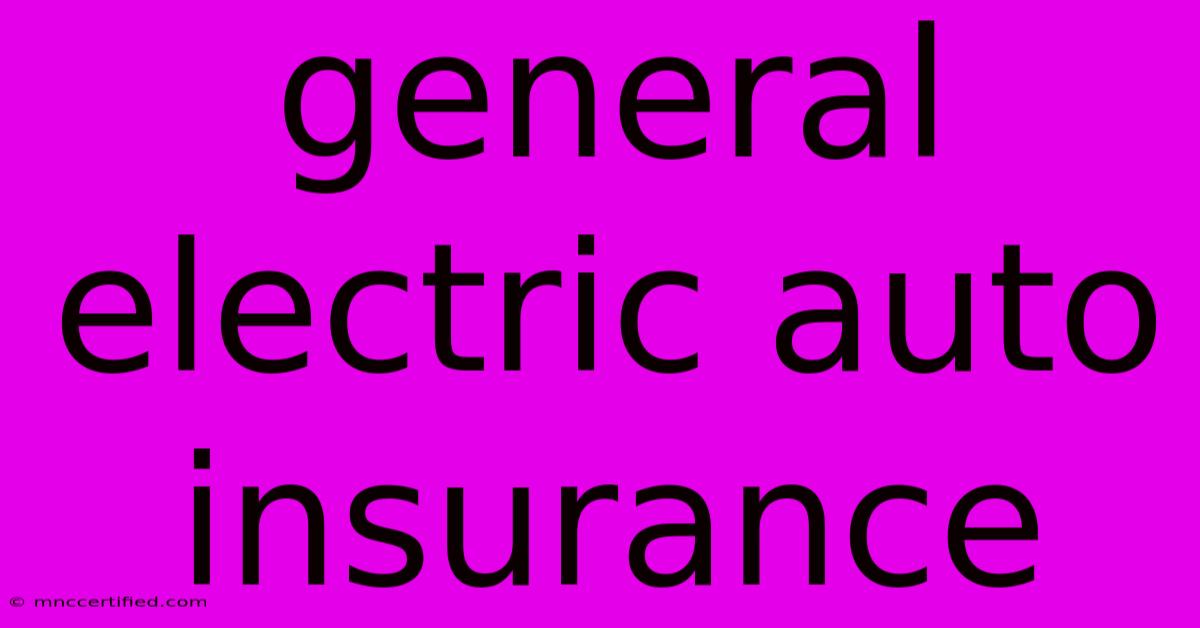General Electric Auto Insurance

Table of Contents
General Electric Auto Insurance: A Comprehensive Guide
Finding the right auto insurance can feel overwhelming. With so many providers offering various plans, it's crucial to understand your options. This guide delves into General Electric auto insurance, clarifying what it offers and what you need to know before purchasing a policy. Note: While General Electric (GE) is a massive conglomerate, it doesn't directly offer auto insurance policies under its own brand. This article will explore how GE might indirectly impact your auto insurance and what options you should consider.
Understanding GE's Indirect Role in Auto Insurance
GE's impact on the auto insurance market is largely indirect. They don't sell insurance directly to consumers, but their involvement touches various aspects of the industry:
- Financial Services: GE's historical involvement in financial services has created connections within the insurance sector. Their subsidiaries and past ventures might have had ties to insurance companies, but these are not directly related to individual auto insurance policies today.
- Technology and Innovation: GE's technological advancements in areas like data analytics and predictive modeling could indirectly influence how insurance companies assess risk and price policies. These advancements improve the efficiency and accuracy of insurance processes, benefiting consumers in the long run.
- Corporate Partnerships: GE's partnerships with various businesses could potentially influence auto insurance offerings through corporate discounts or bundled services. However, these partnerships would need to be investigated independently and are not directly linked to a "GE Auto Insurance" product.
Finding the Right Auto Insurance: Key Considerations
Since GE doesn't offer auto insurance directly, let's look at how to find suitable coverage from reputable providers. Here are essential factors to consider:
1. Assess Your Needs
Before contacting insurance providers, evaluate your individual needs:
- Coverage Levels: Do you need liability-only coverage, or do you require comprehensive and collision coverage?
- Deductible: A higher deductible means lower premiums, but you'll pay more out-of-pocket in case of an accident.
- Vehicle Type and Value: The type and value of your vehicle directly impact your insurance premiums.
- Driving History: Your driving record significantly influences your insurance rates. A clean record generally translates to lower premiums.
2. Compare Quotes from Multiple Providers
Obtain quotes from several reputable auto insurance companies. Many online comparison tools can help you streamline this process. Don't just focus on price; consider the level of coverage, customer service reputation, and financial stability of the provider.
3. Read the Fine Print
Carefully review the policy documents before signing up. Understand the terms and conditions, exclusions, and any limitations on coverage.
4. Consider Add-on Coverage
Some valuable add-on coverages include:
- Uninsured/Underinsured Motorist Coverage: Protects you if you're involved in an accident with an uninsured or underinsured driver.
- Rental Car Reimbursement: Covers the cost of a rental car while your vehicle is being repaired.
- Roadside Assistance: Provides assistance in case of breakdowns or accidents.
Keywords for SEO Optimization
This article targets various keywords, including:
- General Electric auto insurance (primary keyword)
- GE auto insurance
- General Electric car insurance
- Auto insurance companies
- Car insurance quotes
- Best auto insurance
- Cheap car insurance
- Comprehensive auto insurance
- Liability auto insurance
- Uninsured motorist coverage
Off-Page SEO Strategies
To enhance the article's ranking, implement off-page SEO strategies like:
- Backlinking: Seek high-quality backlinks from relevant websites within the insurance or finance industry.
- Social Media Promotion: Share the article on relevant social media platforms to increase visibility.
- Guest Blogging: Contribute relevant articles to other blogs in your niche to build authority and generate backlinks.
By focusing on comprehensive content, relevant keywords, and a robust off-page SEO strategy, this article aims to rank highly on search engine results pages (SERPs) for relevant queries. Remember, always consult with an insurance professional to find the best policy to meet your specific needs.

Thank you for visiting our website wich cover about General Electric Auto Insurance. We hope the information provided has been useful to you. Feel free to contact us if you have any questions or need further assistance. See you next time and dont miss to bookmark.
Featured Posts
-
Life Flight Cost With Insurance
Nov 24, 2024
-
Arsenal 3 0 Nottingham Forest Match Breakdown
Nov 24, 2024
-
November 23rd Arsenals 3 0 Win Over Forest
Nov 24, 2024
-
Insure Car Without Registration
Nov 24, 2024
-
No 9 Ole Miss Faces Florida Noon Abc
Nov 24, 2024